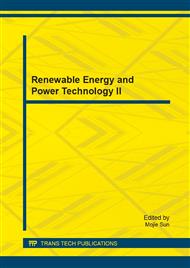p.1175
p.1179
p.1183
p.1191
p.1197
p.1201
p.1205
p.1210
p.1214
Analysis of the Stator Current Change on QFQS-200 Synchronous Generator Loss of Field Procession
Abstract:
Synchronous generator excitation failure can lead to loss of field, after field loss will lead to the generator lose synchronization. The slip is occurred on the rotor, the generator will absorb a large number of reactive powers from power grid. System voltage is reduced, may make some adjacent point voltage is lower than the allowable values, break the stable operation status between load and power supply, and even make the system voltage collapse; The increased stator current may cause other generator, transformer and circuit overload, make backup protection action, and increase the fault extent; From the perspective of the experimental, this article analyzes the change of stator current in the process of QFQS – 200 synchronous generator loss of field, which provides data for the practical operation of the generator.
Info:
Periodical:
Pages:
1197-1200
Citation:
Online since:
October 2014
Authors:
Price:
Сopyright:
© 2014 Trans Tech Publications Ltd. All Rights Reserved
Share:
Citation:


